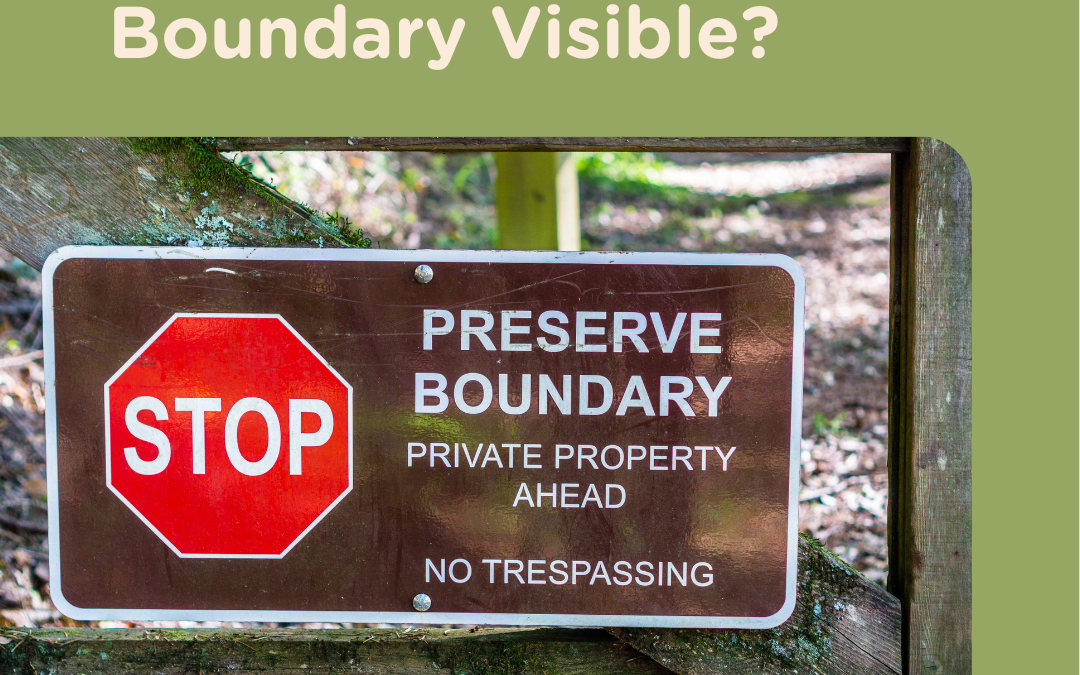Unlike a fence, we don’t always see a boundary. If it’s not clearly marked we can walk right over it without realising what we’re doing.
If it’s an important boundary, we may get ourselves into trouble. But usually, if it’s not visible or marked, it’s not that important.
We use boundary lines to keep the things we value safe. We may use a fence, or a wall, to keep the things we value in and the things we don’t value out.
A boundary is nothing more than a marker. It lets you know where one thing stops and another thing begins.
When our children are little, we use boundaries to keep them safe. We have rules and gadgets and baby-sized fences to keep them from harm. We use them with love. We want our children to be happy and to be safe.
If only it were that simple when they grow!
As our children become physically bigger and mentally more capable we are able to remove more of the physical boundaries. They are able to understand concepts like, “Stay off the road.” They get it. We’ve invested the time and energy to teach them about staying on footpaths, checking for traffic, and using pedestrian crossings correctly. And then we allow them to practice; at first with us hovering in the background before we’re comfortable with their growing ability to manage.
Our rangatahi also need boundaries. It’s just slightly different.
First of all, our rangatahi don’t accept they need boundaries. They want to push against the ones we’ve set for them, and they will. That’s excellent. It just tells you they’re 100% normal and doing exactly what they are biologically programmed to do – push against boundaries as they figure themselves out as complete, whole, and autonomous human being. Their pushing back is an excellent indicator of their ability to think for themselves and make their own decisions.
Secondly, our rangatahi are frequently in better rapport with their peers than they are with us. Again, that’s 100% what they’re meant to do. As they set out on their life they will be looking for other like-minded individuals to be with.
These two large changes in your rangatahi are worth taking into account when you are setting boundaries. And remembering, of course, that it’s not personal. Your rangatahi are simply being rangatahi.
This means, your boundaries need to be clear. They need to be consistent. And they need consequences. Otherwise they won’t be strong enough to stand up when your rangatahi is pushing them, along with their friends.
Often the boundaries parents of rangatahi are struggling with are not so immediately visible. No longer can you put up a physical fence and expect them to stay inside it. Boundaries can, without decent maintenance, become something that isn’t explicitly stated. They can easily become invisible until they are crossed.
So, keep talking. Make sure you are explicit with your boundaries. It’s quite ok to say, “I expect you to be home by 11 pm,” and have that happen. Or, “I expect you to help cook dinner two nights a week.”
When they push back, respond from a place of love. These are opportunities for you to have the conversations they need to have. Gently wind back the clock and find out what they’re struggling with, then reset the boundary with firmness. It might sound like, “I appreciate you’d rather not cook dinner, however we all pitch in around here. Does that sound reasonable to you?” Wait for them to think about it. Get their agreement. “Now, how can I support you to …?” And listen to their ideas.
Their ideas can help you make a plan to move forward together.
Your rangatahi needs you to be their parent now more than ever. You can be friendly. You can be gentle. While still being firm and consistent. You can be the parent they need you to be. Being an adolescent is simply a part of their growth. Guide them well, they’re counting on you.
Boundary setting can be hard work. Register here for our complimentary workshop on March 22nd at 9.30 am (NZ DS time) and upgrade your parenting tool kit.

